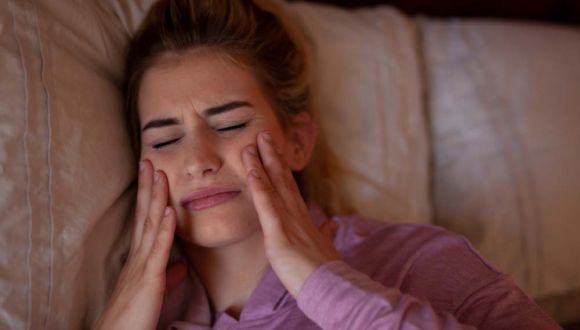Study: Women Suffer More from COVID-related Orofacial Pain
New TAU dental research finds that pandemic stress results in excessive teeth grinding and facial pain
A new study from the Goldschleger School of Dental Medicine at Tel Aviv University's Sackler Faculty of Medicine found that during Israel's first lockdown the general population exhibited a considerable rise in orofacial pain, as well as jaw-clenching in the daytime and teeth-grinding at night – physical symptoms often caused by stress and anxiety. The study was led by Dr. Alona Emodi-Perlman and Prof. Ilana Eli of TAU's School of Dental Medicine, in collaboration with Dr. Nir Uziel and Dr. Efrat Gilon of TAU, and researchers from the University of Wroclaw in Poland, who examined the Polish population's reaction to the pandemic. The paper was published in the Journal of Clinical Medicine in October 2020.
Researchers Dr. Emodi-Perlman and Prof. Eli specialize in facial and jaw pain, with emphasis on TMD (Temporo-Mandibular Disorders) – chronic pain in the facial muscles and jaw joints, as well as Bruxism – excessive teeth-grinding and/or jaw-clenching, which can significantly damage the teeth and jaw joints. These syndromes are known to be greatly impacted by emotional factors such as stress and anxiety.
Accordingly, the researchers decided to conduct a study examining the presence and possible worsening of these symptoms in the general population during the first COVID-19 lockdown, due to the national emergency and rise in anxiety levels. The questionnaire was answered by a total of 1,800 respondents in Israel and Poland.
In Israel, a significant rise was found in all symptoms, compared to data from studies conducted before the pandemic:
- In Israel's general population: The prevalence of TMD symptoms rose from about 35% in the past to 47% (increase of 12%) during the pandemic; the prevalence of jaw-clenching in the daytime rose from about 17% to 32% (increase of 15%); and teeth-grinding at night rose from about 10% to 36% (increase of 25%). Altogether a rise of 10%-25% was recorded in these symptoms, which often reflect emotional stress. People who had suffered from these symptoms before the pandemic exhibited a rise of about 15% in their severity.
- The researchers found a high correlation between the symptoms on the one hand and gender and anxiety level on the other: Women suffer from these symptoms much more than men, and people with high levels of anxiety tend to develop them more than those with lower anxiety levels.
- Dividing the respondents into age-groups also generated interesting results, with the middle group (35-55) reporting a much greater rise in symptoms compared to the younger (18-34) and older (56 and over) groups. At the bottom line, the group that suffered most from the symptoms during the first lockdown were women aged 35-55: 48% suffered from TMD, 46% clenched their jaws in the daytime, and about 50% ground their teeth at night.
In addition, comparing findings in Israel to results in Poland, the researchers found that probability of TMD and Bruxism was much higher among respondents in Poland.
Dr. Emodi-Perlman and Prof. Eli conclude: "Our study, conducted during the first lockdown of the COVID-19 pandemic, found a significant rise in the symptoms of jaw and facial pain, jaw-clenching and teeth-grinding - well-known manifestations of anxiety and emotional distress. We found that women are more likely than men to suffer from these symptoms, and that the 35-55 age group suffered more than the younger (18-34) and older (56 and over) groups. We believe that our findings reflect the distress felt by the middle generation, who were cooped up at home with young children, without the usual help from grandparents, while also worrying about their elderly parents, facing financial problems and often required to work from home under trying conditions."






